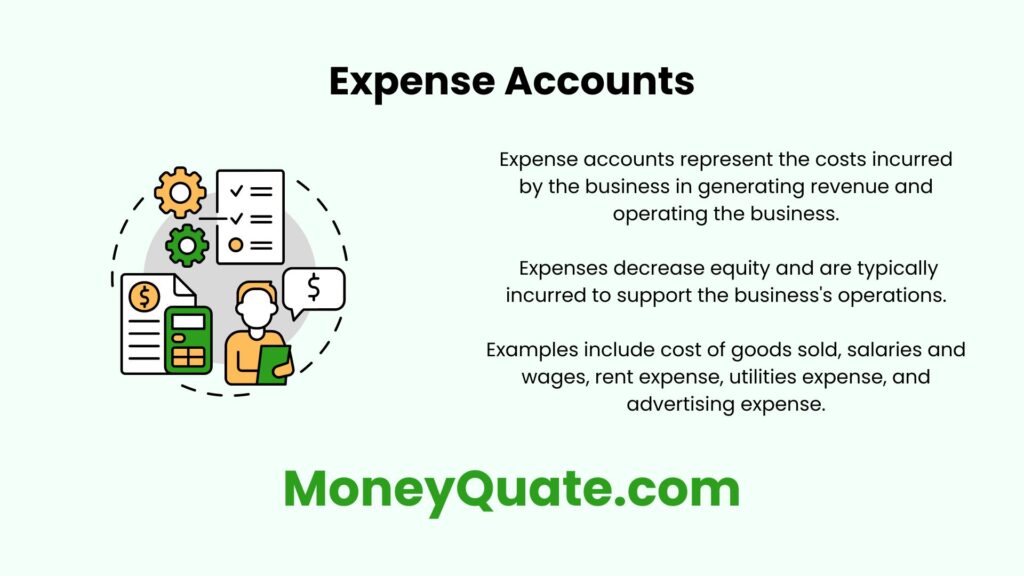Every business spends money to run smoothly, and keeping track of those expenses is crucial! Expense accounts act like financial bloodhounds, sniffing out and recording all the costs your business incurs.
As accountants, we use expense accounts to categorize and analyze your business spending, giving you a clear picture of where your money goes.
Think of them as labeled filing boxes in your financial cabinet, keeping every expense neatly organized.

What Goes in an Expense Account?
Not all spending goes into expense accounts.
Here are some common types of expenses that get their own dedicated boxes (accounts) in the ledger:
- Cost of Goods Sold (COGS): This includes the direct costs associated with producing or purchasing the products you sell. Imagine it as the money spent on the ingredients that make your delicious cake!
- Examples: Raw materials, Manufacturing costs, Product packaging.
- Selling and Administrative Expenses: These are the costs related to selling your products or services and running your business operations. Think of it as the expenses needed to bake, market, and sell your amazing cake!
- Examples: Rent, Salaries, Marketing costs, Utilities.
- Other Expenses: This category captures any other costs your business incurs that don’t fit neatly into other categories. Imagine it as finding a stray receipt in your filing cabinet for an unexpected expense.
- Examples: Bank charges, Travel expenses, Professional fees.
Keeping Track in the Ledger:
Each expense account has its own designated page in the ledger. Here’s a simplified breakdown of what you’ll find inside:
- Account Name: Clearly states the type of expense, like “Rent Expense” or “Cost of Goods Sold.”
- Date: Records the date of any transaction that incurs an expense (rent payment, purchase of supplies, etc.).
- Debit: This side shows all the money your business spends. Think of it as adding receipts to your expense boxes!
- Credit: This side (typically unused) would show any decreases in expenses (rare situations like receiving a refund).
- Balance: This reflects the total amount spent for that specific expense category.
Why Expense Accounts Matter?
Expense accounts are like financial detectives for your business, providing valuable insights in several ways:
- Cost Control: By tracking expenses, you can identify areas where you might be spending too much and find ways to save money.
- Profitability Analysis: Understanding your expenses is crucial for calculating your business’s overall profit, which shows your financial success.
- Budgeting and Forecasting: Expense accounts help you create realistic budgets and forecast future financial needs.
Real-Life Example:
Let’s see an expense account in action:
Account Name: Rent Expense
| Date | Description | Debit | Credit | Balance |
|---|---|---|---|---|
| Oct 1 | Monthly Rent Payment | $2,000 | – | $2,000 |
| Oct 15 | Utilities Payment | $500 | – | $2,500 |
The Spending Tracker Takeaway:
Expense accounts might seem like simple recordkeeping tools, but they play a vital role in managing your business’s financial health.
By tracking your spending, you gain valuable insights, control costs, and ensure your business operates efficiently.
So, next time you hear about expense accounts, remember – they’re not just about recording expenses, they’re about keeping your financial spending on track!